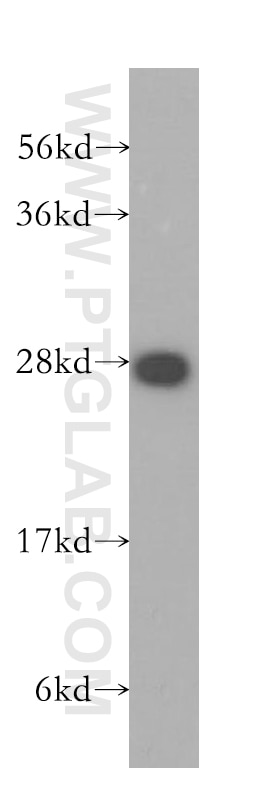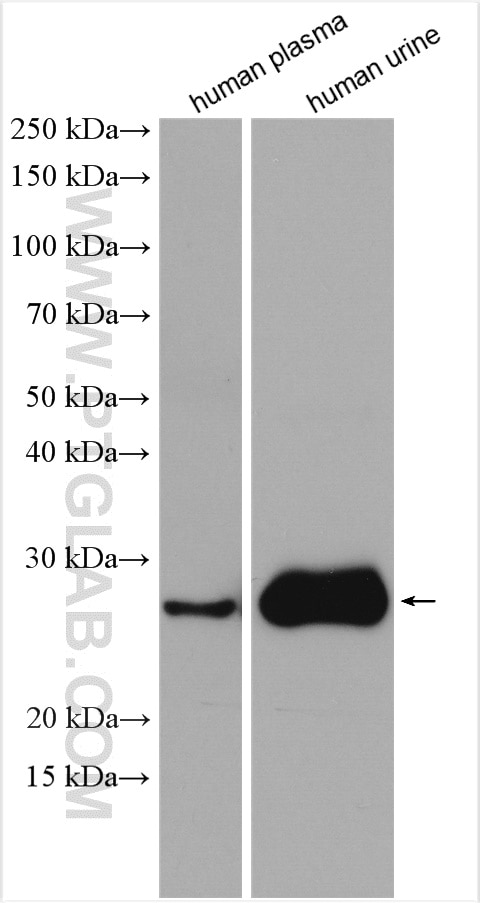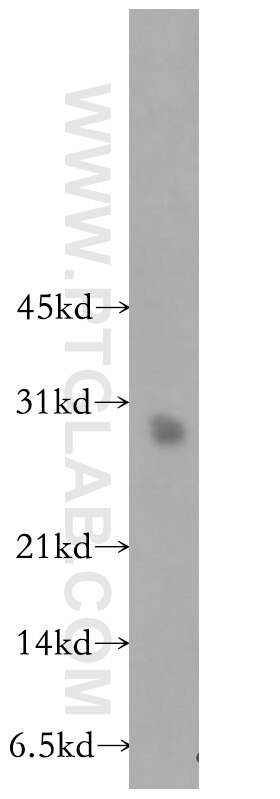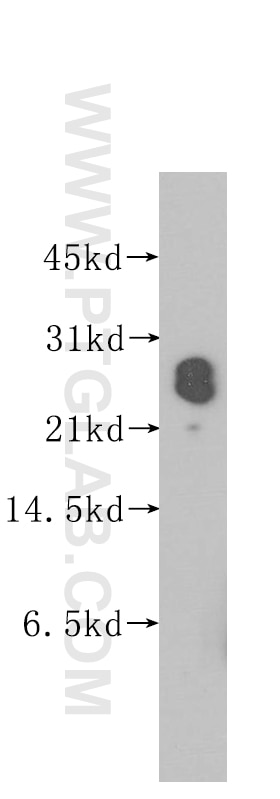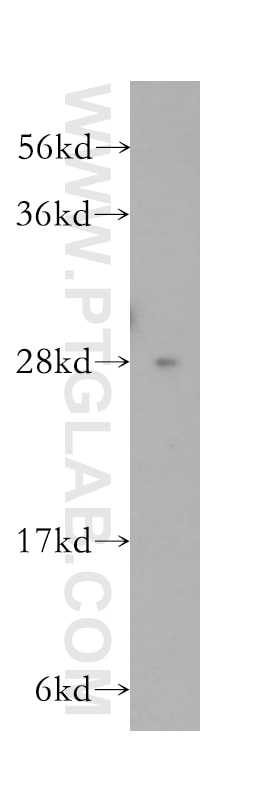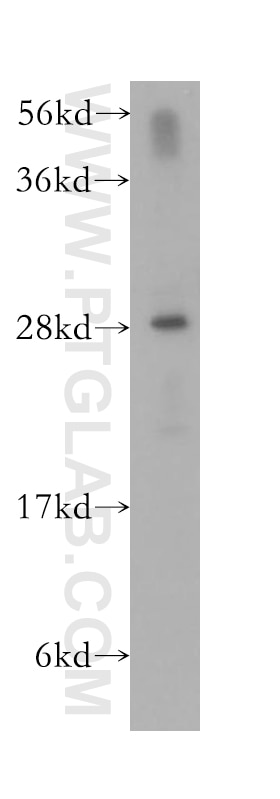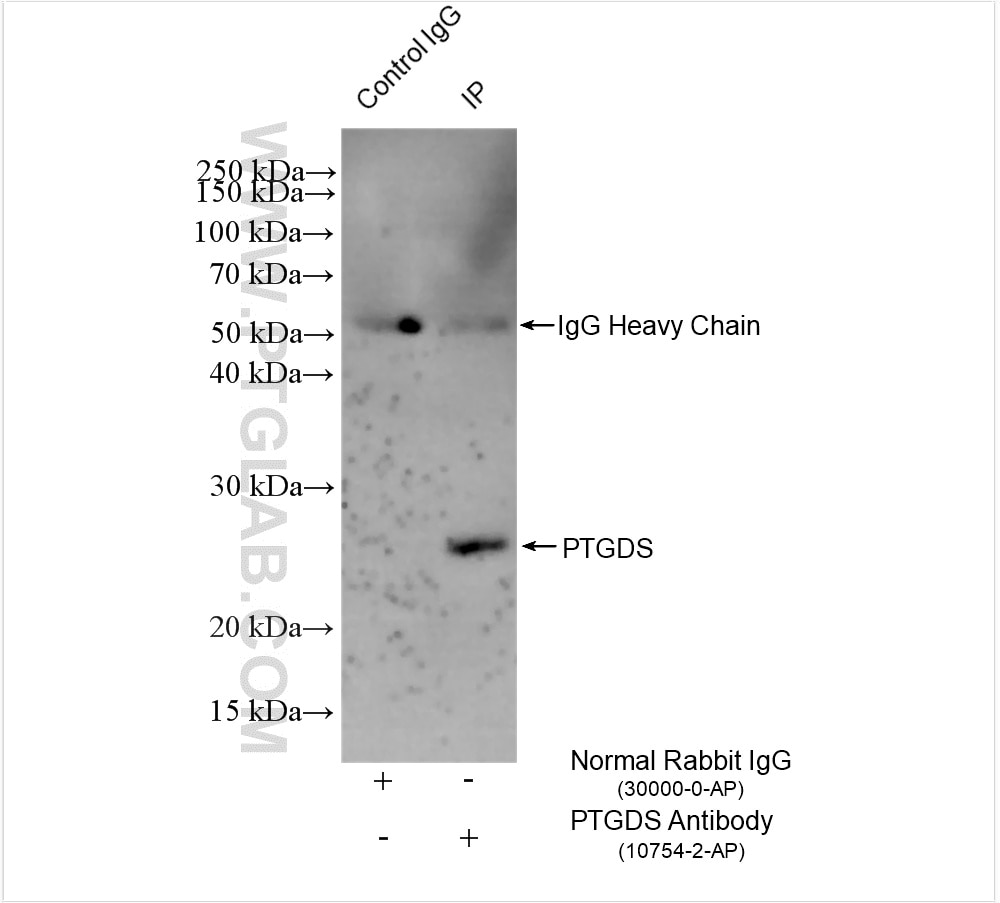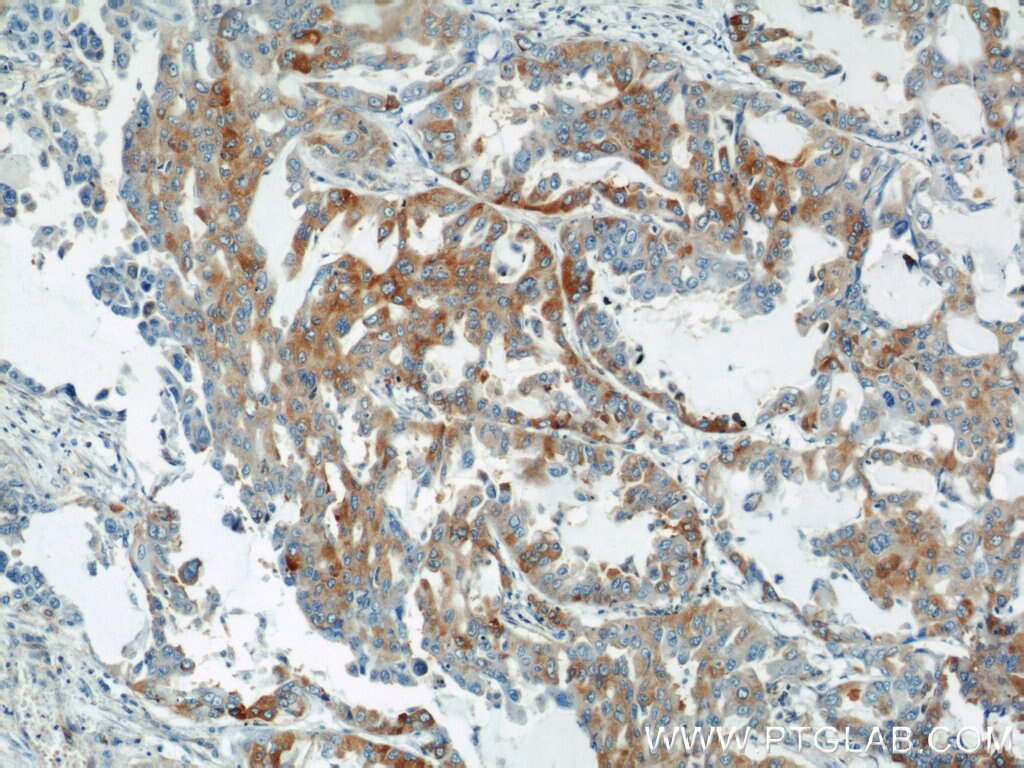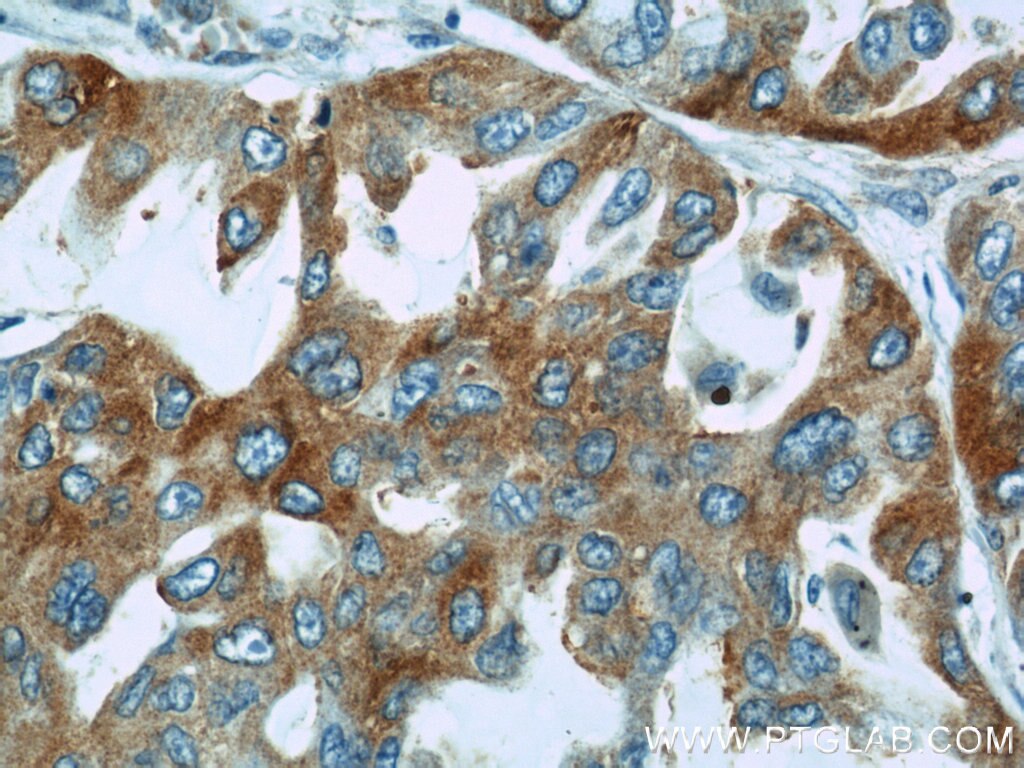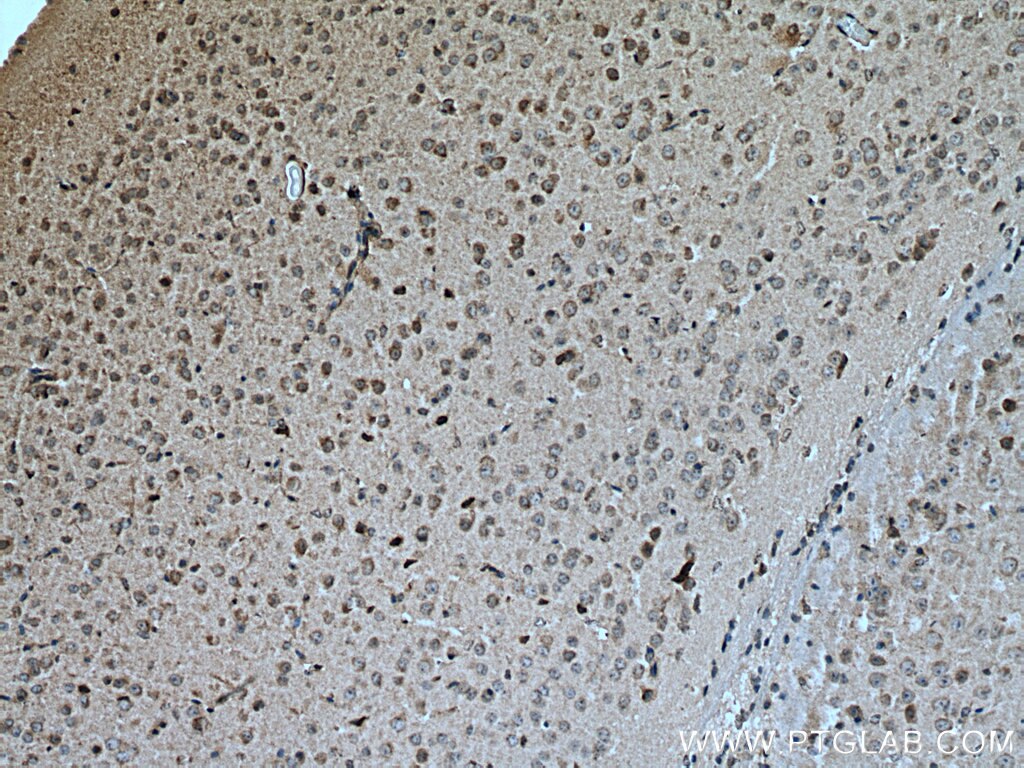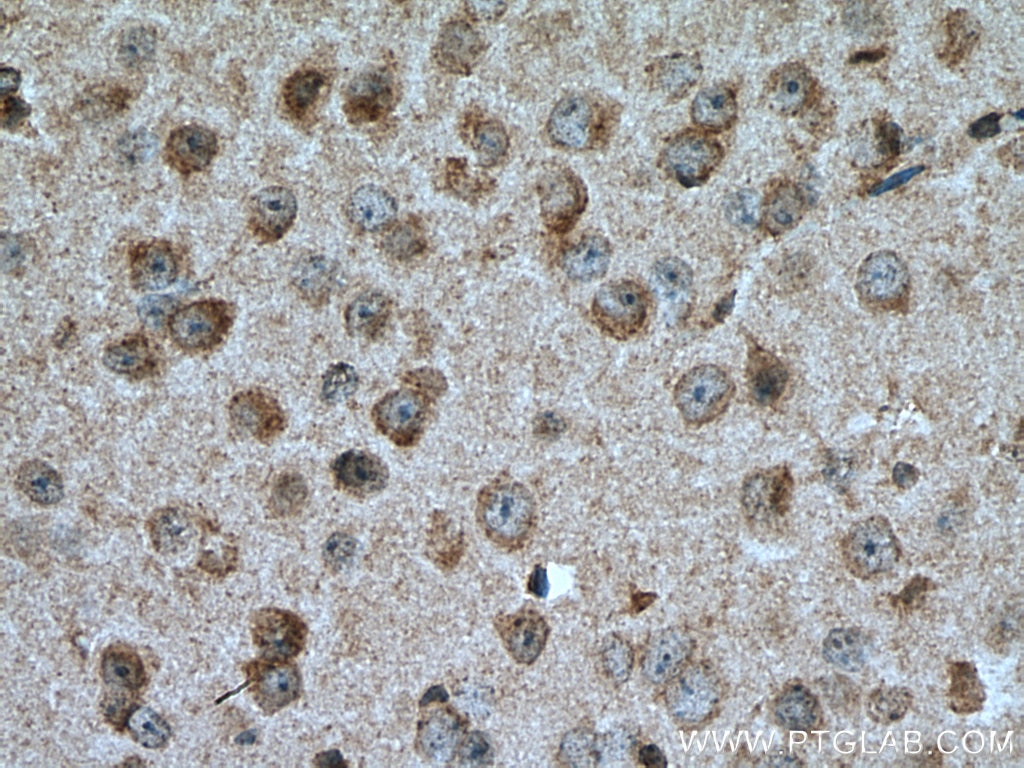Tested Applications
| Positive WB detected in | HeLa cells, human kidney tissue, human plasma, human heart tissue, human colon tissue, PC-3 cells, human urine tissue |
| Positive IP detected in | mouse brain tissue |
| Positive IHC detected in | mouse brain tissue, human lung cancer tissue Note: suggested antigen retrieval with TE buffer pH 9.0; (*) Alternatively, antigen retrieval may be performed with citrate buffer pH 6.0 |
Recommended dilution
| Application | Dilution |
|---|---|
| Western Blot (WB) | WB : 1:1000-1:3000 |
| Immunoprecipitation (IP) | IP : 0.5-4.0 ug for 1.0-3.0 mg of total protein lysate |
| Immunohistochemistry (IHC) | IHC : 1:250-1:1000 |
| It is recommended that this reagent should be titrated in each testing system to obtain optimal results. | |
| Sample-dependent, Check data in validation data gallery. | |
Published Applications
| WB | See 6 publications below |
| IHC | See 5 publications below |
| IF | See 1 publications below |
Product Information
10754-2-AP targets PTGDS in WB, IHC, IF, IP, ELISA applications and shows reactivity with human, mouse samples.
| Tested Reactivity | human, mouse |
| Cited Reactivity | human, mouse, pig |
| Host / Isotype | Rabbit / IgG |
| Class | Polyclonal |
| Type | Antibody |
| Immunogen |
CatNo: Ag1163 Product name: Recombinant human PGDS protein Source: e coli.-derived, PGEX-4T Tag: GST Domain: 1-190 aa of BC005939 Sequence: MATHHTLWMGLALLGVLGDLQAAPEAQVSVQPNFQQDKFLGRWFSAGLASNSSWLREKKAALSMCKSVVAPATDGGLNLTSTFLRKNQCETRTMLLQPAGSLGSYSYRSPHWGSTYSVSVVETDYDQYALLYSQGSKGPGEDFRMATLYSRTQTPRAELKEKFTAFCKAQGFTEDTIVFLPQTDKCMTEQ Predict reactive species |
| Full Name | prostaglandin D2 synthase 21kDa (brain) |
| Calculated Molecular Weight | 21 kDa |
| Observed Molecular Weight | 28 kDa |
| GenBank Accession Number | BC005939 |
| Gene Symbol | PTGDS |
| Gene ID (NCBI) | 5730 |
| RRID | AB_2174610 |
| Conjugate | Unconjugated |
| Form | Liquid |
| Purification Method | Antigen affinity purification |
| UNIPROT ID | P41222 |
| Storage Buffer | PBS with 0.02% sodium azide and 50% glycerol, pH 7.3. |
| Storage Conditions | Store at -20°C. Stable for one year after shipment. Aliquoting is unnecessary for -20oC storage. 20ul sizes contain 0.1% BSA. |
Background Information
Glycoprotein prostaglandin D2 synthase (PTGDS), also known as L-PGDS, PGDS, and LPGDS, is a member of the lipocalin superfamily and plays dual roles in prostaglandins metabolism and lipid transport (PMID: 34743203). PTGD2 functions as a neuromodulator as well as a trophic factor in the central nervous system. PTGD2 is also involved in smooth muscle contraction/relaxation and is a potent inhibitor of platelet aggregation. PTGDS is abundantly expressed in the brain and heart and has also been found in testis, prostate, kidney, spleen and leukocytes. It can be found as a collection of monomeric glycoforms with molecular weights in the 27-34 kDa range (PMID: 32430846).
Protocols
| Product Specific Protocols | |
|---|---|
| IHC protocol for PTGDS antibody 10754-2-AP | Download protocol |
| IP protocol for PTGDS antibody 10754-2-AP | Download protocol |
| WB protocol for PTGDS antibody 10754-2-AP | Download protocol |
| Standard Protocols | |
|---|---|
| Click here to view our Standard Protocols |
Publications
| Species | Application | Title |
|---|---|---|
Int J Mol Sci Zileuton, a 5-Lipoxygenase Inhibitor, Attenuates Haemolysate-Induced BV-2 Cell Activation by Suppressing the MyD88/NF-κB Pathway. | ||
Front Cell Dev Biol Comparative Proteomics and Phosphoproteomics Analysis Reveal the Possible Breed Difference in Yorkshire and Duroc Boar Spermatozoa. | ||
Cell Cycle MicroRNA-138 improves LPS-induced trophoblast dysfunction through targeting RELA and NF-κB signaling. | ||
Cancer Manag Res Decreased PTGDS Expression Predicting Poor Survival of Endometrial Cancer by Integrating Weighted Gene Co-Expression Network Analysis and Immunohistochemical Validation. | ||
Discov Oncol Transcriptomic analysis reveals potential crosstalk genes and immune relationship between triple-negative breast cancer and depression | ||
Med Sci Monit Proteome analysis of human cerebrospinal fluid as a diagnostic biomarker in patients with meningioma. |

